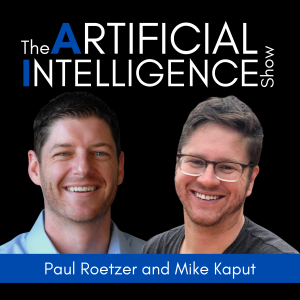
The Artificial Intelligence Show
Business:Marketing

#45: ChatGPT Business, AI Disrupts Politics, and AI-Powered Growth and Layoffs in Big Tech
 2023-05-02
2023-05-02
Big changes are coming to ChatGPT
OpenAI just announced two big updates to ChatGPT. The first is a soon-to-be-released subscription tier called ChatGPT Business. Designed for enterprises, the plan will follow OpenAI’s API data usage policies. That means user data won’t, by default, be used to train ChatGPT. The second is a feature that now allows ChatGPT users to turn off their chat history, which will prevent conversations from being used to train ChatGPT.
We got a startling preview of how AI is going to impact politics
In the U.S., the 2024 presidential election season kicked off with an attack ad generated 100% by artificial intelligence. The ad imagines a future dystopia where President Joe Biden remains in office after next year’s results. The images, voices, and video clips are stunningly real and were created with widely available AI tools. And they foreshadow an election season where AI can be used by all parties and actors to generate hyper-realistic synthetic content at scale.
At the same time, lawmakers in the U.S. and Europe signaled this week that they’re taking more aggressive action to regulate AI. In the U.S., four major federal agencies, including the Federal Trade Commission and the Department of Justice, released a joint statement on their stance toward AI companies. The agencies clarified that they would not treat AI companies differently from other firms when enforcing rules and regulations.
In Europe, the European Parliament has reached a deal to move forward on the world’s first “AI rulebook,” the Artificial Intelligence Act. This is a broad suite of regulations that will govern the use of AI within the European Union. These include safeguards against the misuse of these systems and rules that protect citizens from AI risks.
AI’s major impact on big tech companies
A recent round of tech earnings calls saw major companies like Microsoft, Google, and Meta displaying strong or better-than-expected results—and some of that growth was driven by AI.
In Microsoft’s case, Azure revenue was up 27% year-on-year and Microsoft said it was already generating new sales from its AI products.
Google was less specific about its AI plans but committed to incorporating generative AI into its products moving forward. Reports have surfaced that Meta is playing catch-up to retool its infrastructure for AI but still saw an unexpected increase in sales in the past quarter.
At the same time, these companies face enormous pressure from shareholders to get leaner. Some have conducted layoffs already, with more expected to come. And they’re all relying on AI to capture efficiencies. We saw a stark example of this in practice with a recent announcement from Dropbox that they’re cutting staff by 16%, or 500 people. How should knowledge workers think about this? What steps should we be taking?
Today’s rapid-fire topics include Runway Gen-a for mobile, PwC invests $1 billion in generative AI, and AI and human empathy in healthcare, Replit’s funding round, and Hinton’s Google exit.
Listen to the full episode of the podcast: https://www.marketingaiinstitute.com/podcast-showcase
Want to receive our videos faster? SUBSCRIBE to our channel!
Visit our website: https://www.marketingaiinstitute.com
Receive our weekly newsletter: https://www.marketingaiinstitute.com/newsletter-subscription
Looking for content and resources?
Register for a free webinar: https://www.marketingaiinstitute.com/resources#filter=.webinar
Come to our next Marketing AI Conference: www.MAICON.ai
Enroll in AI Academy for Marketers: https://www.marketingaiinstitute.com/academy/home
Join our community:
Slack: https://www.marketingaiinstitute.com/slack-group-form
LinkedIn: https://www.linkedin.com/company/mktgai
Twitter: https://twitter.com/MktgAi
Instagram: https://www.instagram.com/marketing.ai/
Facebook: https://www.facebook.com/marketingAIinstitute
More Episodes
 2022-06-24
2022-06-24
 2022-06-17
2022-06-17
 2022-05-27
2022-05-27
 2022-05-20
2022-05-20
 2022-05-13
2022-05-13
 2022-05-06
2022-05-06
Create your
podcast in
minutes
- Full-featured podcast site
- Unlimited storage and bandwidth
- Comprehensive podcast stats
- Distribute to Apple Podcasts, Spotify, and more
- Make money with your podcast
It is Free
- Privacy Policy
- Cookie Policy
- Terms of Use
- Consent Preferences
- Copyright © 2015-2024 Podbean.com




